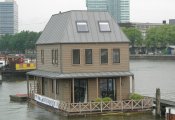Grass found growing on baby’s lung
Chinese surgeons who operated on a baby girl with breathing problems were amazed to find grass growing on her lung.[…]
Finally, doctors decided to perform open-chest surgery.
“We were surprised to find a 3cm piece of grass growing on the baby’s right lung,” said chief surgeon Li Qun.
Doctors removed the grass, and the baby is now recovering. The parents say the grass is the same type as in their yard at home where the little girl often plays.
Doctors says it’s possible grass seed was blown into the baby’s nose and through her respiratory system to the lung and found suitable growing conditions there. But they’ve never seen such a thing before.
Natural World
Klaatu Barada Nikto?
Oh, ffs, what now, dammit? Haven’t we got enough to be going on with?

On top of everything else – you know, the usual tedium, war, disaster, death and pestilence – have aliens invaded too? It’d be bloody typical.
The Peruvian authorities are warning people not to visit the site of a suspected meteorite strike in a remote area of the Andes after 600 people succumbed to “headaches, vomiting and nausea” caused by inhaling gas at the scene.
According to the BBC, the impact occurred on Saturday night near Carancas in the Puno region, around 800 miles (1,300km) south of Lima. Locals reported “a fireball in the sky coming towards them” and the subsequent falling to earth left a 98ft (30m) wide by 20ft (6m) deep crater.
The sizeable dent then began to emit “fetid, noxious gases” which seriously affected curious sightseers. Local resident Heber Mamani told the Beeb: “It [the suspected meteorite] is buried in the earth. That is why we are asking for an analysis because we are worried for our people. They are afraid. A bull is dead and some other animals are already sick.”
The government has accordingly dispatched a team of scientists to Carancas to investigate. Geologist Honorio Campoblanco “discarded the possibility that the symptoms would have been caused by any form of radiation”, but urged the powers that be to prevent people getting too close to the sickness-inducing pit. ®
I don’t know what the actual story behind this is – it’s not known where the gas is coming from though it might well have something to do with heightened geological activity in Peru following the recent huge earthquake. It might not too. That’s what’s so weird and interesting about these stories.
But if it were an alien invasion, I’d blame religion, or what passes for religion in certain circles.
No doubt there are some Heaven’s Gate wannabes who worship Vogons or something who’re convinced that it’s the pilot ship of a galactic fleet that’s coming back from the future to rescue America and who’ve already sent a greeting party down to Peru.
The Scientologists, for example, have been trying to attract aliens for years.
The fundies, as you’d expect, are already declaring it to be yet another sign of the impending End of Days. Even I have to admit to secretly hoping that if it is aliens it’s an invasion of super-intelligent space squid.
It would explain so much.
Oy. Sometimes we humans’re so stupid and gullible we deserve everything that’s thrown at us.
Just the tip of the iceberg
Last week came the news that the Yangtze river dolphin is now extinct:
Sam Turvey of the Zoological Society of London (ZSL), one of the paper’s co-authors, described the findings as a “shocking tragedy”.
“The Yangtze river dolphin was a remarkable mammal that separated from all other species over 20 million years ago,” Dr Turvey explained.
“This extinction represents the disappearance of a complete branch of the evolutionary tree of life and emphasises that we have yet to take full responsibility in our role as guardians of the planet.”
The species (Lipotes vexillifer) was the only remaining member of the Lipotidae, an ancient mammal family that is understood to have separated from other marine mammals, including whales, dolphins and porpoises, about 40-20 million years ago.
The white, freshwater dolphin had a long, narrow beak and low dorsal fin; lived in groups of three or four and fed on fish.
While this sad news got a lot of media attention, the likely extinction of another large Yangtze river species got a lot less, perhaps because it was a fish and not a mammal:
Wei is one of China’s foremost experts on the Chinese paddlefish, a leviathan that reportedly can grow 23 feet (7 meters) long and weigh half a ton.
But the odds of finding even a single one of the aquatic giants may be steadily diminishing.
No adult Chinese paddlefish have been caught in the Yangtze River by fishers since 2003. Even more worrisome, no young paddlefish have been seen since 1995.
Unfortunately, the extinction of these two species is just a small part of the mass extinction process taking place right now all over the world. Most species that disappear do not get any media attention; in fact, of many species of plants and animals that disappear we didn’t even know they existed, having disappeared before we got to know them, killed through the destruction of their habitat in places like the Amazon river basin, or on Borneo, as the video below makes clear.
Now we hear a lot about global warming as the big environmental threat du jour, but that is just part of the problem. Even if it didn’t exist, just the ongoing destruction of habitats worldwide, through deforestation, pollution, desertification and such, would ensure the extinctions will go on. We therefore need to look at the big picture, not just at climate change, but at the whole way in which we as a species manage our environment and our impact on it.
Adhoc measures and cheap technological fixes are not enough to help us get out of this mess. Take as example the idea to reduce the use of fossil fuels in cars –a big source of carbondioxide emissions– with socalled biodiesels, which use palm oil as an important ingredient. It seems a good idea, to use a natural replacement for oil, but because of growing demand for palm oil as a fuel, but it’s already causing increased deforestation and wetland destruction in countries like Malaysia and Indonesia, which in turn also causes increased carbondioxide emissions there…
We’re living in an interconnected world — time we start behaving like it.
The Rodents Of The Apocalypse

Water, water everywhere……but at least the UK’s flood victims haven’t been invaded by voles or rats.
Global warming could contribute to a rat population explosion with potentially disastrous human health consequences, an expert warned today.
Milder winters and hotter springs were already increasing the rat population significantly, he said.
[…]
“Actually one of the major problems as well as the weather is the fact there are more food sources now – there is much more junk food in circulation, particularly in towns and cities.“In addition to that, some rats are now becoming immune to some of the rodenticides on the market at the moment – so it looks as though we’re going to have more rats and less products to control them.
“And even people trying to be greener doesn’t always help – things like building up compost heaps with food in can be a perfect environment for rats to survive in.
“But also we are not as good at sewer-bating any more – at actually killing off the rats in the habitats they survive in best.”
Storms, floods, rats… what’s next?
Make Like A Boy Scout

Hmm, Monday, what shall I do this week?
ARCAM is somewhere I plan on visiting if I’m feeling up to it this coming week (it’s just across the river from us at the Osterdok) in the light of the horrendous rain and the awful disaster-movie-in-slow-motion flooding of swathes of western and central Britain. Now there’s no water or power in some areas too, with 3650,000 affected.
A floating house begins to appeal…
The summer months at Arcam will be given over to the theme of acquatic building in Amsterdam. ARCAM is devoting its attention, in exhibition and book form, to the history of life on boats and barges, and to future prospects for floating construction.
Besides floating homes, the topics include a theatre on the IJ waterway, motorways on pontoons, a church ship, a public library and waterborne gardens. Among Amsterdam examples are the floating housing on Ijburg, plans for floating neighbourhoods on the Ijmeer lake and a floating hostel in the Houthavens area.
There are ecoboots moored on the Noordercanal not too far from us too and they do look pretty incredible (I’ll take some pics and post them later) but they’re not cheap at around 325,000 euro plus associated costs. It’s not a poor person’s answer unless they start building floating rental apartment blocks. It’s unsurprising that most of the current work on them is being done in trendy Ijburg.
Even though NL iis probably the most well-prepared country in the world to resist a sudden indundation, this weather is something new, though we can hardly call it unexpected. Over the past month or so I’ve been looking at the satellite maps and radar every day and you can see clearly that the jet-stream has moved south and moist air is continually being sucked into a deepening weather pattern over NW Europe. There’s a good animation of the past 12 hours of Western European weather at Freie Universität Berlin here and you can see it quite clearly even if like me you’re just an amateur.
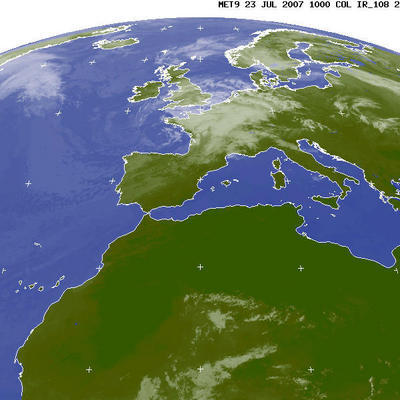
It just squats there like a great ominous toad, sucking in arctic moisture, dropping it over NW Europe, drenching us and holding a stationary purgatorial heatwave over the Eastern Europe, the Balkans and Greece, who are suffering mightily. Now they’re on fire and you can see the smoke from space:
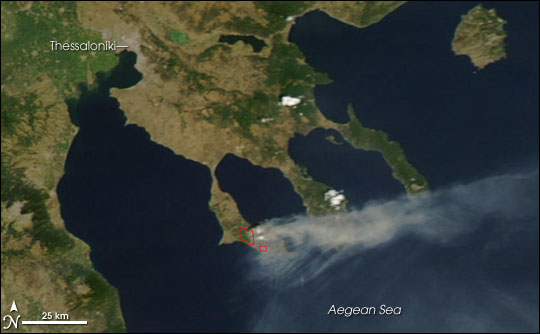
I don’t know about you but I’m torn beteen being scared shitless at the way the climate is going, or alternatively just turning my brain off, sticking to keeping my health stable, looking after my family, growing tomatoes and feeding the cats.
The latter seems the sensible course, especially since the climate has reached the point of no return and there’s really nothing we as individuals can do to reverse it: I refuse to feel guilt about this any more, especially not when those silly, blind, venal buggers in China are seeding the clouds to stop it raining on the Olympics – even as their fellow citizens alternately drown and burn.
In light of this, all this carbon-neutral bollocks and exhorting us all to change our lighttbulbs is like sticking a bloody smiley bandaid on a multiple organ failure.
I’m trying hard to be resigned and philosophical about it all, but it gets a bit difficult when the water and the flames are lapping at your neighbours’ doorsteps.
The least I can do is make sure we’re prepared should it happen to us: if nothing else the UK floods have shown that despite the heroic efforts of the emergency services, when it comes down to it, we have only ourselves to rely on. So put your own emergency kit together as much as possible, as recommended by the Red Cross:
Heat and lights:
— Candles
— Extra batteries
— Fireplace logs
— Flash lights
— MatchesHealth and safety (including food safety):
— Anti-bacterial hand gel and baby wipes
— Appliance thermometer and food thermometer
— First aid kit
— Paper towels
— Re-sealable baggies and garbage bags
— Vitamins, minerals and protein supplementsFood and food preparation:
— Bottled water (estimate 1 gallon per day per person, plus extra for food prep and hygiene)
— Fresh fruits and vegetables
— Nonperishable foods
— Canned meats, chicken and fish
— Canned chili, spaghetti, stew and vegetables
— Granola bars, trail mix and nuts
— Canned fruits and juices
— Evaporated or dry milk
— Instant soups
— Cereals and crackers (low-salt variety, so you don’t crave extra water)
— Baby food and formula
— Pet foods and supplies
— Special dietary items
— Peanut butter and jelly (look for serving-size packages that don’t require refrigeration)
— Hard candy, chocolate bars
— Disposable plates and utensils
— Manual can openerOther necessary supplies include:
Communications:
— A battery-powered AM-FM radio, weather radio and batteries
— A land-line or corded phone
— A list of emergency phone numbers, including numbers for the power, gas and water companies.
— Backup plans in case family members are separated during an emergency. Designate a contact person who is not a member of your immediate family and with whom everyone can check in.Odds and Ends:
— A list of dry ice suppliers (about 15 to 20 pounds of dry ice will keep temperatures in most freezers or refrigerators low for up to 24 hours)
— Frequently used medicines
— Blankets
— Prescriptions
— Eyeglasses
— Battery-operated lantern and batteries
— A wind-up or battery-powered clock
— Warm blankets
— Fuel for space heaters. Be certain to store this safely.
— Blankets
I was gobsmacked at the number of people on Friday who just went about their business commuting, or going on holiday, even though there were flood alerts and severe weather warnings and travel guidance given out – and who did so totally unprepared. I’ve every sympathy with those caught for hours on a motorway with no food or drink or toilets, but bloody hell, wake up people, are you living in a fog? You can’t say you weren’t warned not to travel.
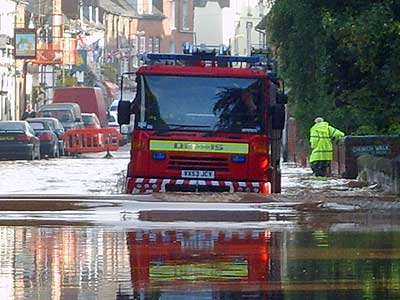
Many of the afflicted seemed to think that a magic hand would come down from the sky and save them and in some cases, it did. But mostly not – it’s been down the flooded and their neighbours to cope. The emergency services have been at full stretch and the armed forces are fucked and can’t back them up; cheers Mr Gordon Briown.
Hillary Benn, who you’d think was in charge, has been worse than useless, clucking and fluttering around like a particularly ineffectual wet hen. It’s taken Gordon Brown 3 days to convene an emergency cabinet committee. Heaven forbid ministers’ family holidays should be delayed…
I hesitate to compare what’s happened in Britain this weekend to Hurricane Katrina, (the two are on entirely different scales) but there are things in common if you ignore those differences in scale: both climate-change-fuelled events have highlighted just how fast and how quickly the infrastructure of civil society can fail and both also have shown the complacency and lack of preparation of everyone, residents included.
Katrina and it’s aftermath showed US citizens that it’s folly to rely on a central government that has been hollowed out by ideology, privatisation, cuts, political corruption and plain inertia. When called to do their job, FEMA just weren’t there.
Ditto New Labour.
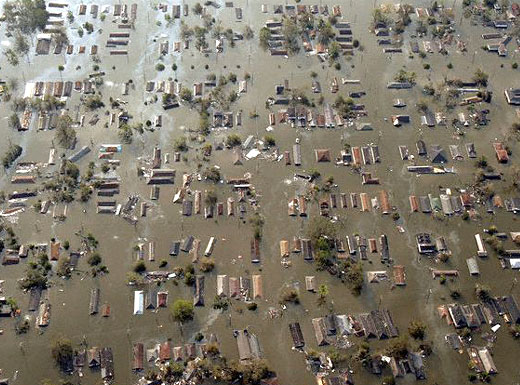
But even given their culpability, even if officialdom had been there, sometimes it seems as though people expect the impossible from the frontline respoinders in the emergency services.
I don’t know what it is – we seem to have a collective delusion that should there be a natural disaster somehow it’s all going to turn out all right and the good guys will come riding to the rescue. Er, no. That’s Hollywood. Life is not like that.
The thing about the emergency services is they have to be paid and equipped and housed even when not needed, and we don’t seem to want to pay to do that. In any case, they’re not superhuman – they can’t stop disasters, they can only help ameliorate their effects and if these types of disasters occur more frequently, as is predicted, what few emergency services we have will soon become exhausted.

So I’m going to make sure we have emergency supplies, clean water and flashlights and the rest; because if I were to get a stomach bug or not have anything to drink my kidneys’d give out in a day or so and I’d die. It’s down to me, as it is to everyone, to ensure my own survival in a crisis.
So make like a boy scout or girl guide or brownie (I’ll go for brownie, the uniform’s my colour) – and be prepared.
